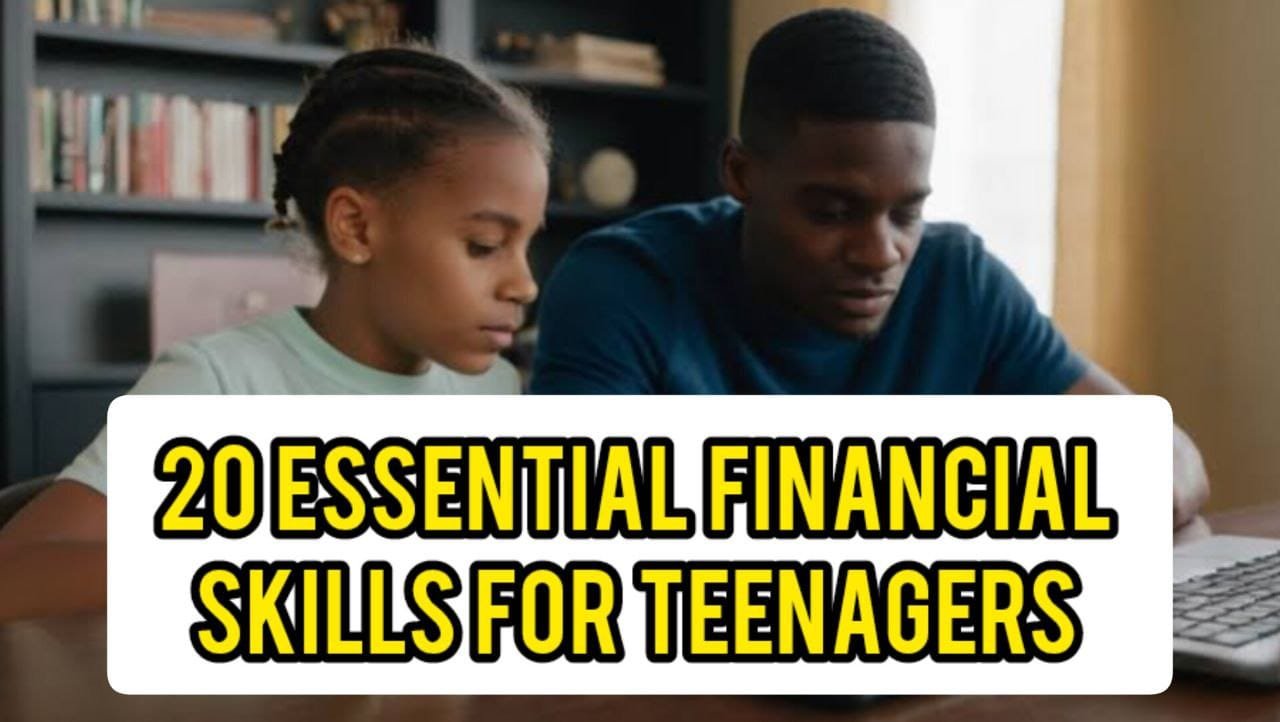Building financial skills as a teenager can set you up for a lifetime of smart money management. Imagine the power of knowing how to save, budget, and invest before you even hit adulthood! The earlier you start learning these essential financial skills, the easier it will be to make confident, wise financial decisions as you grow older. Let’s explore 20 essential financial skills every teenager should know, from budgeting basics to understanding credit.
20 Essential Financial Skills For Teenagers
1. Setting Financial Goals
To get anywhere financially, you need a roadmap, and setting goals is the first step. Whether you’re saving for a car, college, or just a little extra spending money, defining what you want financially helps you create a plan to reach it. Start with short-term goals, like saving for a concert ticket, and work up to long-term goals, such as building a college fund.
2. Understanding Needs vs. Wants
One of the most important skills in financial management is learning to differentiate between needs and wants. Needs are essential expenses, like food, clothing, and school supplies, while wants are extras like video games or dining out. Recognizing the difference will help you make spending decisions that align with your goals and prevent impulse buying.
3. Creating a Budget
Budgeting is the backbone of good financial habits. It’s like a spending plan that tells your money where to go. As a teenager, start by tracking your income from allowances, part-time jobs, or gifts, and then list your expenses. You don’t need a fancy spreadsheet; a simple notebook will do the trick. Over time, budgeting will help you see where your money is going and how you can save more.
4. Learning to Save Money
Saving is a skill that will serve you well throughout life. Even if it’s just setting aside $5 a week, learning to save consistently can build your financial discipline. Consider opening a savings account to safely store your money and watch your savings grow over time. Establishing this habit early on is key to building wealth down the line.
5. Understanding Bank Accounts
Bank accounts are where you can store and manage your money. Most banks offer accounts specifically for teens, and understanding the basics of a checking account and savings account is crucial. A checking account is great for everyday spending, while a savings account is designed to help your money grow over time. Knowing how to use these accounts will help you manage your money more effectively.
6. Using Debit Cards Responsibly
With a debit card, you can make purchases using money directly from your bank account. While it’s convenient, it’s essential to keep track of what you spend to avoid overdrawing your account. Always remember to check your balance and be cautious with spending to avoid any unexpected charges.
7. Understanding Compound Interest
Compound interest is one of the most powerful concepts in finance. It’s the interest you earn on both your initial deposit and the interest it has already earned. Think of it as a snowball effect – the longer you let your money sit in an interest-bearing account, the more it will grow. The earlier you start saving, the more time your money has to grow exponentially.
8. Setting Up an Emergency Fund
An emergency fund is a small stash of money set aside for unexpected expenses, like a phone repair or school trip. Building this fund helps prevent you from dipping into your savings or borrowing money. Even a modest emergency fund can help you handle life’s little surprises without financial stress.
9. Smart Shopping and Price Comparison
Learning to compare prices and shop smartly will save you money in the long run. Before making any purchase, check different stores or online platforms to find the best deal. This skill will help you make wise spending decisions, whether you’re buying clothes, gadgets, or school supplies.
10. Tracking Expenses
Keeping tabs on your spending is essential. You can use a budgeting app or even a simple notebook to write down every purchase. This practice helps you see where your money is going and whether you’re sticking to your budget. Tracking expenses makes you more mindful of your spending habits and allows you to spot areas for improvement.
11. Understanding Credit and Credit Scores
Credit might seem like an “adult” concept, but it’s never too early to learn. A credit score is a number that represents your creditworthiness, which impacts your ability to get loans, rent an apartment, or even land a job. Understanding how credit works, like avoiding late payments and not taking on too much debt, can prepare you for future financial responsibilities.
12. Avoiding Debt and Loans
Debt can weigh you down financially. While some debts, like student loans, may be necessary, learning to avoid credit card debt and unnecessary loans early can save you a lot of trouble. Only borrow what you’re sure you can repay, and make it a habit to use cash or debit for everyday purchases instead of credit.
13. Learning About Investments
Investing isn’t only for adults with high incomes. As a teenager, you can start learning about stocks, bonds, and other investment options. Many brokerage platforms offer simulated trading for teens to practice without real money. Understanding investment basics now can lead to better decisions and wealth-building opportunities down the road.
14. Managing Time and Money Together
Good time management can help you balance work, school, and saving. For example, balancing a part-time job with schoolwork can be tricky but rewarding financially. Managing your time wisely will help you earn money without sacrificing your studies, setting you up for a more balanced future.
15. Building Good Spending Habits
Healthy spending habits are key to financial stability. Try to avoid impulse purchases by making a list of what you need before going shopping. Also, give yourself a 24-hour rule for any big purchase. This extra time lets you reflect on whether you really need the item, helping to curb unnecessary spending.
16. Learning About Taxes
Taxes might seem complicated, but a basic understanding can go a long way. Whether you’re earning from a part-time job or a small side hustle, taxes come into play. Learning about income tax, Social Security, and other deductions will make it easier to manage your earnings and avoid surprises.
17. Practicing Generosity and Giving Back
Managing your finances isn’t just about growing your wealth; it’s also about helping others. Consider setting aside a small amount each month to donate to a cause you care about. Generosity not only feels good but also teaches you about managing money with empathy and purpose.
18. Developing a Frugal Mindset
Frugality isn’t about being cheap; it’s about being wise with your resources. Practicing frugality as a teenager means looking for discounts, DIY options, and avoiding unnecessary expenses. Learning to live within your means and make the most of what you have will help you save more and enjoy financial stability in the future.
19. Exploring Financial Technology (Fintech) Apps
Fintech apps make managing money easy and accessible. Apps like Venmo, Cash App, or PayPal allow you to send and receive money, while budgeting apps like Mint or Goodbudget help track your expenses. Getting comfortable with these apps will help you handle money efficiently in a digital world.
20. Embracing the Habit of Lifelong Learning
Finance is constantly evolving, and staying updated is crucial. Embrace learning about finance as a lifelong journey. Read books, follow financial blogs, or watch videos from reputable financial educators. Developing this habit will ensure you continue growing your financial knowledge throughout your life.
Conclusion
Mastering financial skills as a teenager might seem like a lot, but starting early makes a huge difference. The habits you build now can shape your future and empower you to make confident financial decisions as you grow older. Whether it’s saving, budgeting, or learning to invest, each skill adds to your financial toolkit. So, start small, stay consistent, and enjoy the journey to financial freedom!
FAQs
Why is it important for teenagers to learn financial skills?
Learning financial skills early helps teenagers make smart money choices and sets them up for a stable financial future.
Can teenagers invest with small amounts of money?
Yes, many apps and online platforms allow teenagers to start investing with as little as $1 through fractional shares.
What’s a simple way for teenagers to start saving money?
Setting aside a small percentage of any earnings or allowance each week is an easy way to start building savings.
How can I manage my money better as a teenager?
Start by creating a budget, tracking expenses, and differentiating between needs and wants. This helps you avoid overspending.
Are there any good financial books for teenagers?
Yes, books like Rich Dad Poor Dad for Teens by Robert Kiyosaki and I Will Teach You to Be Rich (young adult edition) by Ramit Sethi are excellent choices for beginners.

Don has over 5 years of experience as an SEO expert, writer, and digital media professional. He has led teams to create engaging news broadcasts and has covered major news stories. Hems has worked with top outlets like Bloomberg, Yahoo! Finance, and Fox Business Network, focusing on insurance, business, and finance. His skills combine SEO knowledge with strong storytelling, making him an expert in creating content that is original, optimized and informative.

